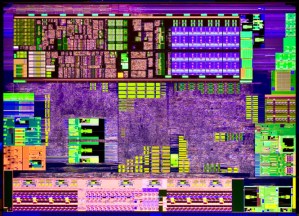
Never one to let a marketing opportunity for its processors slip by, chipmaker Intel has announced it has released the first versions of its low-powered Atom processor aimed at the storage markets for home and small business use. The initial line consists of two chips—the Atom D410 single-core CPU and the Atom D510 dual-core CPU, paired with Intel’s 82801IR I/O controller—and NAs device makers like LaCie, LG, QNAP, Thecus, and Synology are already on board to delivery Atom-based NAS devices for homes and small businesses.
“Today, households and small offices have an ever-increasing number of computers, laptops, netbooks, and mobile phones that create and consume digital content,” said Intel Data Center general manager Seth Bobroff, in a statement. |”This advancement in mobility coupled with the explosive growth of data and media are creating the need for centralized, easy-to-use network storage solutions for the home and small office.”
Intel says NAS devices based on the new Atom platform should be able to handle up to 20 users streaming as much as 30 Mbps over a local network—of course, that rather assumes the entire local network is gigabit Ethernet and nothing else is going on. But the platform does offer NAS device manufacturers a lot of capabilities to play with, including support for gigabit Ethernet, 12 USB 2.0 ports, six PCI Express lanes, and eSATA capability to enable users to easily expand storage. Intel says the Atom platform can be used to create devices running Microsoft Windows Home Server or Linux-based solutions. And, even better for the eco-conscious, the new processors consume as little has half the power of previous generations.


